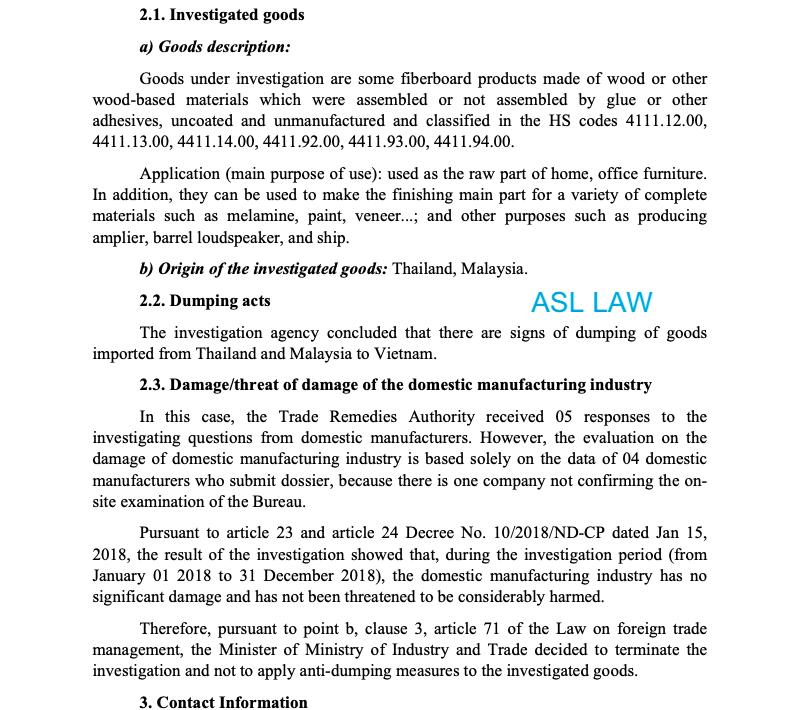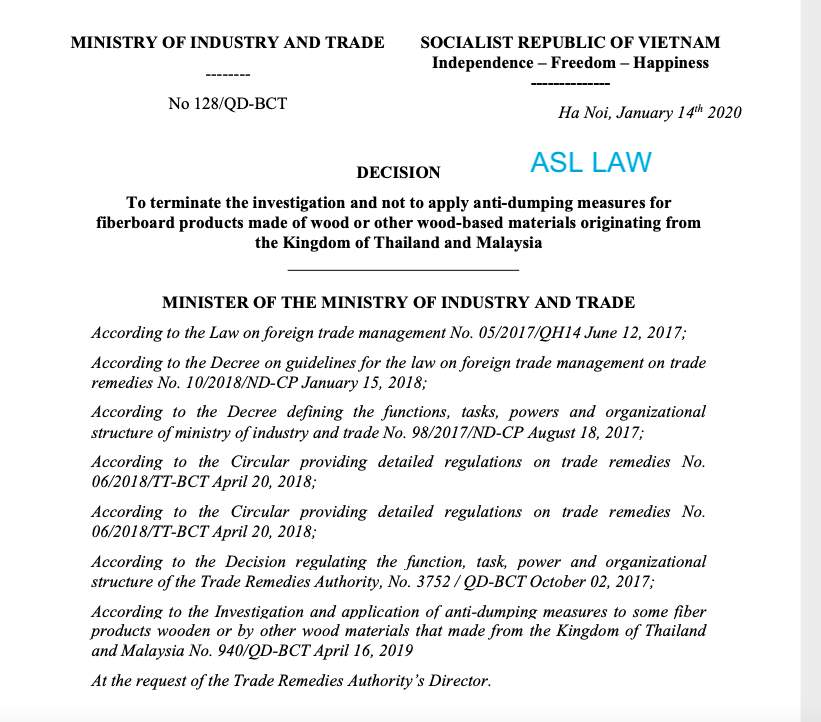After nearly 01 year following the anti-dumping case of the Investigation and application of anti-dumping measures to some fiber products wooden or by other wood materials that made from the Kingdom of Thailand and Malaysia No. 940/QD-BCT April 16, 201 9, ASL LAW has finally succeeded in helping clients avoid anti-dumping measure (No duty).
A summary of this case as follows:
On October 23, 2018, the Department of Trade Remedies, Ministry of Industry and Trade (hereinafter referred to as Investigation Agency) received the dossier requesting for investigation and application of anti-dumping measures for some uncoated, dry fiber board products originating from the Kingdom of Thailand (“Thailand”) and Malaysia.
The requesting party is a representative of the domestic manufacturing industry, including 04 companies: (i) VRG Dongwha MDF Wood Joint Stock Company; (ii) VRG Kien Giang MDF Wood Joint Stock Company; (iii) MDF VRG Quang Tri Wood Joint Stock Company; and (iv) Kim Tin MDF Joint Stock Company.
In April 16, 2019 Minister of Industry and Trade issued Decision No. 940 / QD-BCT on anti-dumping investigation against certain products fiber boards of wood or another wood substance originating from the Kingdom of Thailand and Malaysia.
In order to draw a final conclusion on whether dumping is involved here, the Investigation Agency must consider a lot of factors, including some of the following:
+ Assessing the impact of imported goods
Pursuant to Article 3.2 of the WTO Antidumping Agreement, the investigating authority shall consider whether there has been an absolute significant increase in imports or relative to output or consumption in the importing country or not.
In the case of fiberboard, the review of the proportion of imports from sources indicates that goods from Thailand and Malaysia which are increasingly take up a larger share. This shows that the impact from imported goods on the domestic industry, if any, mainly comes from Thailand and Malaysia.
+ Price impact of investigated imported goods
Article 3.2 of the WTO Anti-Dumping Agreement provides:
“With respect to the price effect of dumped imports, the investigating authority must consider whether there is a significant price difference between the selling price of the dumped imported goods and the selling price of similarly manufactured goods in the country, or consider whether the impact of the imported goods under investigation have caused the price pressure at a level significantly or prevent price increases significantly, which should have happened. None of these factors can be decisive. ”
+ Economic factors are considered when determining significant losses of a domestic manufacturing industry
Article 3.4 of The WTO Anti-Dumping Agreement provides for the following: The investigating authority must consider the impact of dumped imports on the domestic manufacturing industry and state the factors to be assessed: all factors and suitable economic indicators related to the status of the industry, including the decline in actual and potential revenue, profits, output, market share, productivity, rate of return (ROI), or capacity used ; domestic price impact factors; magnitude of dumping margin; Real and potential negative impacts on cash flow, inventories, labor, wages, growth, the ability to raise capital or invest. In addition, the investigating authority may consider other factors and none of them will be decisive.
+ Evaluation of the cause and effect relationship
The investigating agency said that the volume and price of imports from other countries were not the cause of the domestic industry’s losses. There is no basis for the cause of the loss in the domestic industry due to exports or poor labor productivity. Increasing production costs, supply-demand relationship are the main reasons for the decline in the profits of domestic manufacturing industry.
On the basis of the above conclusion, based on the Foreign Trade Administration Law and its guiding documents, the Investigation Agency recommends the Minister of Industry and Trade to issue a decision to terminate the investigation of the case and not take anti-dumping measures. Objectively, this is a great victory of the market in general and partly a victory of foreign enterprises.

Result: No Anti-dumping measures applied to our clients
After nearly 01 year of investigation, recently Vietnam Ministry of Industry and Trade has decided to terminate the investigation and not to apply the anti-dumping measures to some fiberboard products made of wood or other wood-based materials, assembled or not assembled by glue or other adhesives, uncoated and unmanufactured, belonging to the HS codes 4411.12.00, 4411.13.00, 4411.14.00, 4411.92.00, 4411.93.00, 4411.94.00 and originating from the Kingdom of Thailand and Malaysia (Job Code: AD06) with detailed content mentioned at the Notification attached with this Decision.
Pursuant to point b, clause 3, article 71 of the Law on foreign trade management, the Minister of Ministry of Industry and Trade decided to terminate the investigation and not to apply anti-dumping measures to the investigated goods.
Therefore, ASL LAW, Vietnam Anti-dumping law firm, has closed the case with the great result for our clients.

 Tiếng Việt
Tiếng Việt 中文 (中国)
中文 (中国) 日本語
日本語

